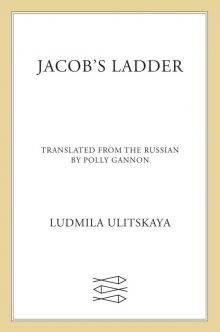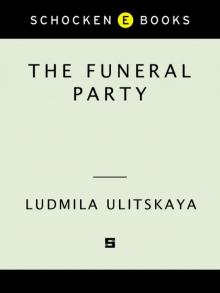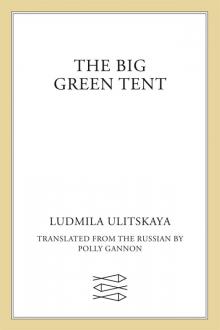- Home
- Ludmila Ulitskaya
Life Stories
Life Stories Read online
Life Stories
original works by Russian writers*
* The writers and translators in this volume have donated their creative output to this collective work, so that all proceeds from its sale might go to benefit Russian hospice care.
Copyright © 2009 for this collected work by Russian Information Services, Inc. All rights reserved.
Copyright to the individual works in this volume is governed by U.S. and international copyright laws. Works may not be reproduced in any manner without the expressed, written permission of the copyright holders. For permission to reproduce selections from this book, contact the publisher at the address below.
Cover image © Alleng (dreamstime.com).
ISBN 978-1-880100-58-5
Published by Russian Information Services, Inc.
PO Box 567
Montpelier, VT 05601-0567
www.russianlife.com
[email protected]
phone 802-223-4955
fax 802-223-6105
It's time, my friend, it's time! my heart begs for peace—
Days fly past, and each hour carries off
Another fragment of our life, but together we
Make our plans for life, and lo—in our time we die.
In the world there is no happiness, but there is peace and free will.
Long have I dreamed of that enviable fate—
Long have I, a weary slave, schemed to flee
To a distant abode of labor and pure delight.
Alexander Pushkin
Contents
Instead of an Introduction, by Lyudmila Ulitskaya
About Hospice Care
Joan, by Andrei Gelasimov
A Short History of Amateur Performing Arts Groups on the Ships of the Caribbean Pirate Fleet in the First Half of the 17th Century, by Boris Grebenshchikov
Serenity, by Yevgeny Grishkovets
Shelter, by Alexander Kabakov
Earplugs, by Alexander Khurgin
All Alone, by Eduard Limonov
Oedipus Complex, by Dmitry Lipskerov
The Heart of a Snark, by Sergei Lukyanenko
The One-Day War, by Vladimir Makanin
Trash Can for the Diamond Sutra, by Marina Moskvina
Ontology of Childhood, by Viktor Pelevin
Joe Juan, by Ludmila Petrushevskaya
Grandmother, Wasps, Watermelon, by Zahar Prilepin
Fog, by Dina Rubina
Anyway, by Dunya Smirnova
Black Horse With A White Eye, by Vladimir Sorokin
The Novel, by Vladimir Voinovich
Rehabilitating d'Anthès, by Viktor Yerofeyev
The Storm, by Leonid Yuzefovich
Contributors (Authors and Translators)
Instead of an Introduction
Lyudmila Ulitskaya1
Dear Friends!
Today, you and I have no plans to die. Quite the opposite: we make our plans for the years ahead, and much of what we plan comes to pass. We value our energy and our time, enjoy the luxury of good health, take pleasure in being with loved ones, and occasionally even have the privilege to travel, taking in the nature and culture of other lands.
To enjoy life, to be grateful for its gifts is part of being human. But there are things—difficult, distressing, unbearable things like illness, suffering or death—that poison our joy of living. Yet even in this there is something good: it means that our souls are alive and can respond to the suffering of the others; the power of this response reveals to us our true place in the universe. As long as we are capable of empathy, we are morally alive.
The natural progression of human life—from youth, strength, beauty and health to decay, illness, suffering and death, which none of us can escape—occurs in a social environment that can either aggravate our suffering or alleviate it. In this dimension, it is not the laws of nature that are at work, but the laws, rules and stereotypes created by our society. And Russian society today presents a dismal picture. Our state, which once assumed responsibility for the social wellbeing of its people, is failing to meet its obligations. Yet we as a community have other reserves—both material and spiritual.
Despite our society's deep inertia and pessimism, more and more of our people are willing to address great social ills. A few years ago, I was introduced to Vera Millionschikova's efforts to organize and manage the First Moscow Hospice, and this became a turning point for me: I realized that, even in our complex conditions, one could do this difficult work in a way that creates meaning and beauty, extracting dignity from the chaos that surrounds us. This is not only about helping people who are suffering and dying—this is about building a better society, about fostering people's respect for themselves. Vera Millionschikova's cause, the hospice center she created, gives us the opportunity to change our lives, to affect our world, to become more human.
Contributing to the work of the Vera Hospice Charitable Fund gives us an opportunity to nurture a noble and necessary cause, to subtract from the great sum of human suffering in our not-altogether-well state. It is also a conscious move to take responsibility for a sphere in which our government appears to invest little meaning or value. Yet, in fact, it is here, in the last hospital bed, that the miracle of human life, that greatest of values, is fully and ultimately present.
Translation by Nina Shevchuk-Murray
Note for Introduction
1. Author and member of the Board of Trustees of the Vera Hospice Charity Fund.
About Hospice Care
Hospice care is a free institution of social medicine that is completely new to Russia. Hospice care gives terminal cancer patients and their families not only relief from pain, but also other medical, social, psychological, spiritual and legal assistance; services are provided not only for the duration of the illness, but also in the aftermath of the loss of a loved one. Hospice accepts patients that other hospitals have rejected as "hopeless."
In the fifteen years of its activity, First Moscow Hospice, under the unwavering leadership of Vera Vasilievna Millionschikova, has earned an impeccable reputation and has helped thousands of people. When hospice workers care for the dying and educate their families about the basics of such care, they lift the immeasurable burden of guilt plaguing those who do not have time, confidence or knowledge to help a loved one when recovery is no longer possible.
In hospice care, more than in any other medical establishment, the staff work intimately with death, pain and the family's tears, 365 days a year, 24 hours a day.
Hospice cares for the dying, most of them elderly. But the more important thing is that the patients are still alive. What they need is not a speedy death but a dignified life. Like all living beings, they need love and care. There are many such patients; in Moscow alone 23,000 people succumb to cancer every year. And even though Moscow already has eight hospice care centers, the need for hospice care is far from being met. Hospice care is necessary for the handicapped, for coma patients, for those paralyzed as a result of a stroke, for AIDs patients and for disabled children.
Hospice does not abandon such patients. They are still alive, and this means that doctors must help them live for as long as life is given to them. Hospice is not the house of death; it is a home for hope and faith in human strength.
Contact information:
First Moscow Hospice
10 Dovatora Street, Moscow
Phone: 8-499-245-59-69, fax: 8-499-245-4322
E-m
ail: [email protected], website www.hospice.ru
Hospice Commandments
1. Hospice is comfortable conditions and decent life to the very end.
2. We work with living people. The only difference between us and our patients is that they are most likely to pass away before us.
3. We should not hurry death, nor artificially prolong life. Everyone lives one's own life. Nobody knows how long it will be. We merely accompany our patients in their last stage of life.
4. One must not take money from those who are leaving this world. Our work must be unselfish.
5. We cannot alleviate our patients' pain and sufferings on our own. Only together with patients, their relatives and friends, do we derive strength.
6. Patients and their relatives are a single whole. Be considerate when entering a family. Do not judge, but help.
7. If a patient cannot be healed, it does not mean that nothing can be done. What seems a trifle to a healthy person might be very significant for our patients.
8. Every person is unique. Do not impose your beliefs upon a patient. Patients give us more than we can give them.
9. Accept everything from a patient, up to aggression. Try to understand a person before doing anything. Accept a person in order to understand him/her.
10. Be always ready for truth and sincerity. Tell the truth if a patient wants and feels prepared for it... but do not rush.
11. An unplanned visit is no less valuable than a planned one. See a patient as frequently as possible. If you cannot visit—give a call; if you cannot call, think of a patient and call anyway.
12. Do not hurry when with a patient. Do not stand—sit beside him/her. However little time you have, it is still enough to do your best. If you think you have done less than you could, talking with the relatives of the deceased will comfort you.
13. Hospice is the patients' home. We are the hosts of the house. With this in mind, change your footwear and wash your face.
14. Your reputation is the reputation of the hospice.
15. The main thing you should know is that you know very little.
About Vera Hospice Charity Fund
Despite the renaissance in Russian traditions of charitable giving and patronage, some areas of life (for example, death and dying) remain taboos in our society, and as a result, terminally ill people—hospice patients—are left with little or no donor support, forgotten by the state and forced to struggle with their pain and fear alone.
The Vera Hospice Charity Fund undertakes such "unpopular" charity activity. We cannot appeal to our donors with the promise of producing a cure; all we do is help the dying live as long as they are meant to live, without pain, in comfort and with dignity. In Moscow alone, 50,000 people need such assistance every year. In addition, the Fund helps provide honorable compensation for the spiritually draining and physically demanding work of those who care for the terminally ill and who make hospice centers homes of mercy and humanism.
The Vera Fund was created to support the work of hospice centers and other medical establishments that practice palliative medicine in the Russian Federation. Our criteria for choosing beneficiaries are simple: the services must be provided for free, with the utmost openness and transparency; the establishment must have a good reputation and must work in accordance with the commandments of hospice care.
The current Board of Trustees includes Natalia Gutman, Eliso Virsaladze, Lyudmila Ulitskaya, Vladimir Voinovich, Ingeborga Dapkunaite, Tatiana Drubich, Andris Liepa, Marina Aleksandrova, Tatiana Arno, Avdotya Smirnova, Mikhail Alshibaya, Vera Millionschikova and Zoya Yeroshok.
Hospice establishments are in great need of charitable assistance, since the support they receive from state budgets is insufficient to ensure that patient services fully embody the hospice ideology: that the conditions of the patients' stay are as home-like as possible and that the staff receive appropriate compensation for their work. The state allocates 70 million rubles annually for hospice care, a sum that covers the cost of drugs and meals for the patients. Only with charitable support can we achieve dignity and comfort for our patients, with things like phones and TV sets in their rooms, flowers and gifts at holiday time, anti-sore mattresses and multifunctional hospital beds, and an unlimited supply of diapers and bed linens. Since all proceeds from the sale of this collection of stories are going to benefit the Vera Fund, your purchase of this book will result in a valuable cash donation to meet these important needs.
As part of its mission, the Fund not only assists medical establishments, their patients and staff financially, but also seeks to unite hospice centers into a team, hold professional development seminars for hospice staff, and educate the public about hospice care and the needs of the terminally ill people.
Contact information:
39, Proletarsky prospect, kv 27,
115477 Moscow, Russia
Phone/fax: 8-495-321-7685
E-mail: [email protected]
website: www.hospicefund.ru
Translation of introductory notes by Nina Shevchuk-Murray
Joan
Andrei Gelasimov
He loved that little thing. Actually, he didn't like it much at first, because he was hot all over and was running a temperature, while that thing was cool, and he shuddered when it got pressed against him. He turned away and made a face. His head was all wet. But he didn't complain, because by then it was hard for him to cry. He could only groan hoarsely and shut his eyes. But then he started to reach for it anyway. Because it was shiny.
"You want me to listen to you again?" says the doctor and takes that thing off.
I completely forgot what it was called. That thing to listen to what goes on inside you. The one with green tubes. The disk that sticks to your back if they hold it there too long. Then, when it gets unstuck, it makes a funny sound. And it tickles a little, too. And your head spins.
Little Sergei grabs that thing and puts it in his mouth.
The doctor says: "Stop it. It's a caca. Give it back to me."
I say: "He'll let go of it in a moment. He just wants to lick it a bit. Let him hold it, because he cried the whole night."
She stares at me and says: "Are you all alone with him?"
I say: "All alone. There is nobody else."
She stares at me and says nothing. Then she says: "Tired?"
I say: "Not really. I'm used to it by now. Except my arms get tired. By morning, they feel like they're going to fall off."
She says: "Do you carry him like this all the time?"
I say: "He doesn't walk yet."
She stares at him and says: "How old is he?"
I say: "Two. Except he had trauma at birth."
She says: "I see. How old are you?"
I say: "I'm eighteen."
She said nothing and then began to pack her bag. Little Sergei gave her back that thing right away. Because he had no strength to resist.
At the door she turns and says: "There shouldn't be anything serious any more. But if something comes up, call us again. I'm on call till eight."
I said to her "Thank you," and she turned and shut the door behind her.
She's a good doctor. Little Sergei liked her. As to our regular district doctor, he doesn't like her at all. He always cries when she comes to see us. But the district doctor knows everything there is to know about us. That's why she's never surprised.
But this time I called the ambulance. I left him alone for ten minutes and ran to the all-night store that sells vodka. There is a guard there with a cell phone.
Because at four o'clock I got scared. He cried all night, but at four he stopped. I got scared that he was going to die.
"Your mother died because of you. It's all your fault." This is what the principal told me when I came to her to ask her if the school would hire me.
By then, I didn't need the diploma any more. I needed to feed little Sergei. The baby formula cost a lot. The imported stuff. In those pretty cans. The district doctor said I had to feed him
those. They have good vitamins. That's why I came to the school to ask for work, not to go to classes. Especially since I had fallen way back, anyway. The money left over from Mom had run out. She used to say—what's the use of saving it? We'll go to France and earn a thousand times more. And she used to listen to her Edith Piaf tape all the time.
"You knew she had a bad heart," the principal told me. "And now you stand here shamelessly and stare at me. How could you even have come here again?"
I'm looking at her and thinking: "How could Mom spend so much time here?" Some calling in life. A French language teacher. They too had known that she had a bad heart. Still, they wagged their tongues about me in the teachers' room. Even in her presence. Because they were sure it was her fault, too. A teacher who didn't watch over her own daughter properly. She would then cry at home, but refused to take sick leave. She would put in her tape and sing along.
And then she died.
"You won't hire me?" I say to the principal.
"Sorry, my dear," she says. "It's too much responsibility. We have young girls here. We must think of them."
And what am I, a whore? Who can't even be shown to the kids?
"You know, this movie is not for kids," Mom used to say, sending me off to bed.
She would stay up and watch it on TV.
I would lie in bed and think—what's the point of watching all this heavy breathing? I could hear it even in my room.
When Tolik fell off the construction site, he too was breathing heavily. Except his eyes wouldn't open. He lay there with his head on the bricks and breathed very loudly. The construction site from which he fell was actually our school. It's where the principal now works.
Later we all went to that school. Except for Tolik. That's because after that he couldn't go anywhere at all. Even to the old wooden school—he never went there, not even once. He just sat at home. Sometimes they let him come down to the courtyard, and then I wouldn't play with anybody anymore. Just throw stones at boys, so they quit bothering him. Because he would start to yell when they bothered him. And his mother would come out of the house and cry on the steps. They were promised a new apartment in a big brick building, but they never got it. Some woman came from the Housing Management Department and said that it would be too much for a retard. That's why they stayed on in our neighborhood.

 Jacob's Ladder
Jacob's Ladder Life Stories
Life Stories The Funeral Party
The Funeral Party Medea and Her Children
Medea and Her Children The Big Green Tent
The Big Green Tent